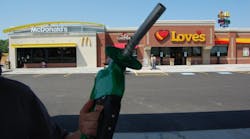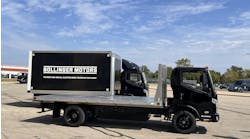National average retail pump prices for both diesel and gasoline continued to decline this week, according to data tracked by the Energy Information Administration (EIA).
Diesel dropped 1.1 cents this week to a national average of $3.858 per gallon, according to the agency, which is 5.7 cents cheaper compared to the same week in 2013.
EIA noted that diesel prices dropped in every region of the country, with diesel only exceeding the $4 per gallon mark in three areas: New England, down 8/10ths of a penny to $4.044; California, down 6/10ths of a penny to $4.090; and the West Coast, down 9/10ths of a penny to $4.017. However, the agency pointed out that with California removed from the mix average diesel prices on the West Coast dropped 1.4 cents to $3.918 per gallon.
Gasoline declined 5.4 cents this week to a national average of $3.539 per gallon, which is 10.7 cents per gallon cheaper compared to the same week in 2013, according to EIA.
The Rocky Mountains region recorded the only increase in gasoline prices this week, the agency said, recording a 5/10th of a penny increase to $3.645 per gallon.
By contrast, gasoline prices declined in every other area of the country, falling the most in the Midwest (an 8.8 cent decline to $3.409 per gallon) followed by the Central Atlantic (down 5.2 cents to $3.613). The East Coast ($3.542), Lower Atlantic ($3.444) and Gulf Coast ($3.349 – home to the cheapest gasoline in the nation this week) all tied for third with a 4.5 cent per gallon drop in gasoline prices.
EIA noted too that U.S. refineries have been processing record volumes of oil recently. Refinery inputs hit a record-high 16.8 million barrels per day (bbl/d) for the weeks of July 14 and July 21, exceeding the previous records established during the summer of 2005.
The agency noted that refineries in the Midwest and Gulf Coast in particular pushed the total U.S. input volume upward, as these refiners' access to lower-cost crude oil, expansions of refining capacity, and increases in both domestic demand and exports contributed to higher refinery runs.
EIA also pointed to analysis published in its This Week in Petroleum report that refinery gross inputs in the Midwest have been higher than the five-year range since late April. Typically, Midwest drivers use more motor gasoline in the summer, and some of that has come from the Gulf Coast.
However, recent and planned changes to pipeline infrastructure have altered both the type of products in the pipelines and direction of flow – and those changes increase the incentive for Midwest refiners to boost their own gasoline production, EIA said.
The Midwest's record-high runs of 3.8 million bbl/d for the week ending July 11 pushed the region's refinery utilization to 100.3%, the first time any of the Petroleum Administration for Defense Districts (PADDs) has exceeded 100% since EIA began publishing weekly PADD-level utilization in June 2010, the agency noted.



